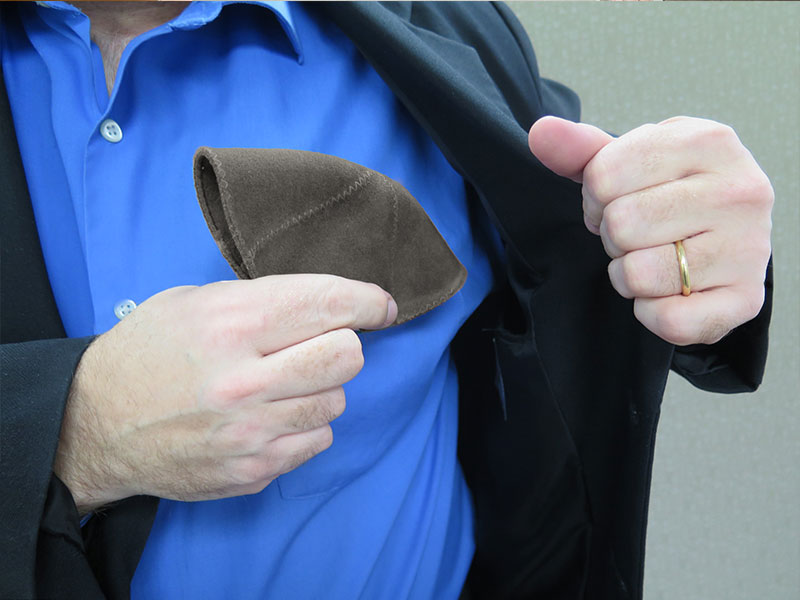After a week of controversy, the incoming Quebec government softened its tone on the wearing of religious symbols by public servants and signalled that it is open to compromise.
On Oct. 9, MNA Simon Jolin-Barrette, spokesperson for the Coalition Avenir Québec’s (CAQ) transition team, backtracked from earlier comments made by the party that it would be prepared to fire public servants who refuse to remove their religious garb.
Jolin-Barrette said the government might consider a “grandfather” clause in the planned legislation that would allow teachers who currently wear such symbols to continue to do so, but new hires would still have to comply with the law.
READ: NORMA JOSEPH: DON’T TREAD ON MY RELIGION
The CAQ also conceded that the government could not dictate what judges wear due to the independence of the judiciary. The province’s magistrates council would be responsible for applying any ban.
Jolin-Barrette said the CAQ, which assumes power on Oct. 18, is willing to work with the opposition parties in finding an acceptable course of action.
The day after the Oct. 1 provincial election, Premier-elect François Legault said his majority government might invoke the notwithstanding clause of the Canadian Charter of Rights and Freedoms to implement what has been CAQ policy on state religious neutrality for years. He said he would also amend the Quebec Charter of Human Rights and Freedoms to ensure the law is enforced.
The Liberal Party, now the official Opposition, adopted Bill 62, which prohibits faces being covered in the delivery or receiving of public services, a part of the law currently facing a legal challenge. The law did not specifically refer to other religious attire.
Earlier, the Centre for Israel and Jewish Affairs (CIJA) and B’nai Brith Canada voiced serious concerns about the incoming government’s plan to ban the wearing of religious symbols, such as hijabs, turbans, kippot, and crosses in the workplace by certain public servants. These would include those who represent “state authority,” besides teachers and judges, Crown prosecutors, police officers, and prison guards.
Since the election, the CAQ has said those who insist on continuing to wear such symbols would be offered other jobs in the civil service or risk dismissal.
Legault said this interpretation of state neutrality, part of a planned reinforcement of secular values, is what the “vast majority” of Quebecers want.
Noting that the CAQ has long promised to bring in such a law, CIJA Quebec co-chair Rabbi Reuben Poupko said in a prepared statement that its position is “a departure from the [2008] Bouchard-Taylor Commission’s recommendations, which did not include teachers, but is narrower in scope than the Parti Québécois’s Bill 60 [introduced in 2013], which intended to ban religious symbols for all public sector employees.”
Rabbi Poupko said CIJA has expressed its concerns to the CAQ on numerous occasions and continues to “reiterate our long-held position that religious neutrality should be imposed on public institutions, not on individuals. We will closely study the forthcoming bill, make our concerns known to government, and participate in any eventual parliamentary or public commission.”

B’nai Brith “condemned” the proposed ban, and the possible firing of staff, “who freely express their religious beliefs, as an assault on the fundamental rights and freedoms of Quebecers and at odds with Canadian values,” said regional director Harvey Levine.
B’nai Brith called on the government to reconsider introducing such an “inflammatory” law.
Despite the controversy, CIJA extended “warm congratulations” to Legault on winning a majority of 74 of 125 seats in the National Assembly.
“We look forward to working with the CAQ government on a range of issues of importance to the Jewish community and to all Quebecers,” it stated.
Quebec vice-president Eta Yudin told The CJN that the non-partisan CIJA has fostered an ongoing relationship with the CAQ, which was founded in 2011, as it does with all major provincial parties.
CAQ members have been responsive to issues raised by CIJA, she said.
Yudin noted that during the 2016 World Social Forum, held in Montreal, CAQ MNAs Benoît Charette (Deux-Montagnes) and Nathalie Roy (Montarville) raised concerns about BDS being on the agenda.
In November of that year, Charette made a declaration in the house recognizing the international day of recognition of Jewish refugees from Arab lands, she added.
CIJA also believes the CAQ is supportive of closer bilateral ties between Quebec and Israel, and is confident a planned representative office in Israel will go ahead under the new government. The idea followed on Liberal Premier Philippe Couillard’s trade mission to Israel last year.
On Oct. 7, an estimated 3,000 people marched through downtown Montreal protesting the CAQ’s policies on religious symbols and on immigration.
READ ALSO: CAQ’S ELECTION WILL HAVE MAJOR IMPACT ON JEWISH COMMUNITY
